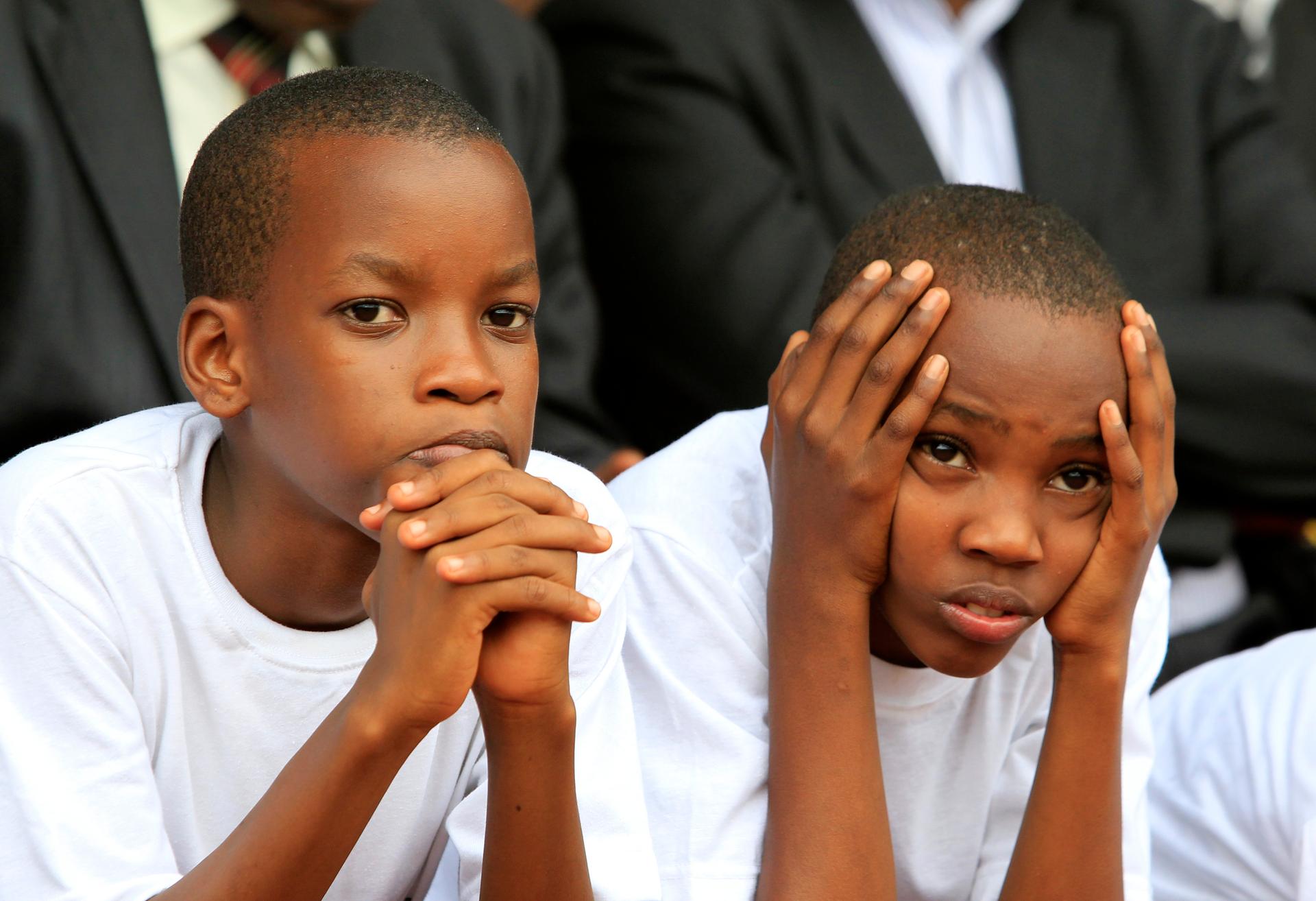Rwandans let their pain and memories erupt as they observe the 20th anniversary of the genocide
Rwandan boys watch as a flame is escorted through a Kigali suburb marking the 20th anniversary of the genocide.
Some of those packed shoulder-to-shoulder into Kigali's main stadium Monday couldn't help themselves.
They let out piercing screams that were "uncontrollable and inconsolable."
So reports New Yorker staff writer Philip Gourevitch who stood among the crowd as Rwandans observed the 20th anniversary of the genocide at Kigali's national stadium this morning.
Many of those in attendance had lost family members in the 1994 massacres, when Hutu militiamen slaughtered some 800,000 men, women, and children who were mainly ethnic Tutsis.
The national stadium is one of several sites where many Rwandans sought refuge.
Gourevitch says the emotional outbursts during commemoration events came "in unexpected bursts … eruptions of utterly unfiltered memory and feeling and trauma … Screams of terror, of utter agony, of grief."
Caregivers brought stretchers for those who were overcome. Trauma counselors were also on hand.
Otherwise Gourevitch says Kigali was quiet on Monday, as many who didn't attend the yearly ceremony stayed indoors.
"There's always a strong mood of the past welling up, and the emotions are close to the surface," he says. "For much of the year, people go about their business and even quite deliberately don't open all the valves, as it were. This is what happens when you concentrate in a group for the purpose of commemoration and allow those valves to open."
Gourevitch notes that some Rwandans are having something akin to "flashbacks … as if they are responding to attackers or seeing something terrible … The memory of the days of killing in this country 20 years ago are — at those moments — like 20 seconds ago."
He urges the world community to look beyond simple "never again" sloganeering.
"The lesson of Rwanda is that the world is a dangerous place, and people who rely on the international community for protection are often deserted," he says.
Philip Gourevitch is working on a new book called, You Hide That You Hate Me and I Hide That I Know: Living with It in Rwanda.
Some of those packed shoulder-to-shoulder into Kigali's main stadium Monday couldn't help themselves.
They let out piercing screams that were "uncontrollable and inconsolable."
So reports New Yorker staff writer Philip Gourevitch who stood among the crowd as Rwandans observed the 20th anniversary of the genocide at Kigali's national stadium this morning.
Many of those in attendance had lost family members in the 1994 massacres, when Hutu militiamen slaughtered some 800,000 men, women, and children who were mainly ethnic Tutsis.
The national stadium is one of several sites where many Rwandans sought refuge.
Gourevitch says the emotional outbursts during commemoration events came "in unexpected bursts … eruptions of utterly unfiltered memory and feeling and trauma … Screams of terror, of utter agony, of grief."
Caregivers brought stretchers for those who were overcome. Trauma counselors were also on hand.
Otherwise Gourevitch says Kigali was quiet on Monday, as many who didn't attend the yearly ceremony stayed indoors.
"There's always a strong mood of the past welling up, and the emotions are close to the surface," he says. "For much of the year, people go about their business and even quite deliberately don't open all the valves, as it were. This is what happens when you concentrate in a group for the purpose of commemoration and allow those valves to open."
Gourevitch notes that some Rwandans are having something akin to "flashbacks … as if they are responding to attackers or seeing something terrible … The memory of the days of killing in this country 20 years ago are — at those moments — like 20 seconds ago."
He urges the world community to look beyond simple "never again" sloganeering.
"The lesson of Rwanda is that the world is a dangerous place, and people who rely on the international community for protection are often deserted," he says.
Philip Gourevitch is working on a new book called, You Hide That You Hate Me and I Hide That I Know: Living with It in Rwanda.
